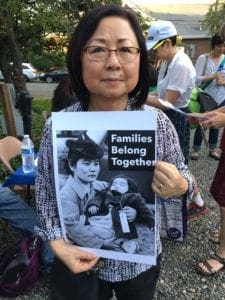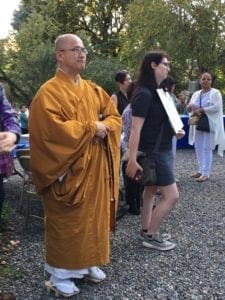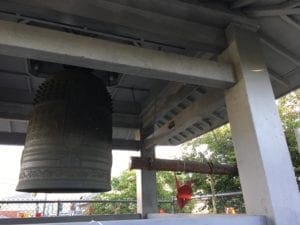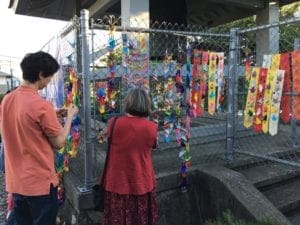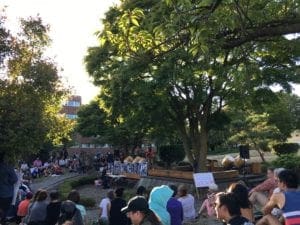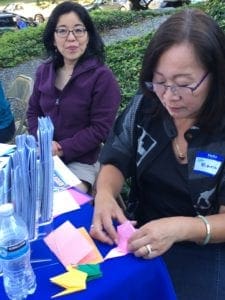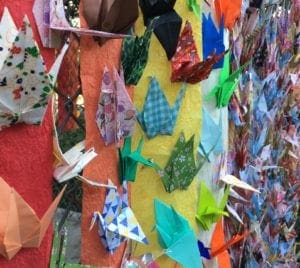Sankofa Impact – Civil Rights Foot Soldier, Silas McGhee
Silas McGhee was from a family of civil rights activists in Greenwood, Mississippi. In 1964, he worked to desegregate a movie theater. He was targeted for this work, and shot in the face by someone whom many believe was a local klansman. You can listen to the story of what happened to Silas the night he was shot, with this first-person account by Bob Zellner. Zellner is a civil rights foot soldier who regularly speaks to participants of Sankofa Impact. Sankofa Impact is a Seattle-based organization that confronts our shared history of racism and resistance with place based learning opportunities.
Producer: Ruth Bly
Photo: About Greenwood Mississippi
Canoe Journey 2019 – Samish Landing
This year’s Tribal Canoe Journey, honoring ancient indigenous traditions is underway. The Lummi Nation is hosting this year’s festivities by welcoming over one hundred indigenous canoes to their shores. Canoe families come from Washington state, British Columbia, Alaska and as far as Hawaii. (more…)
Taking Sanctuary : Jaime Rubio and Keiko Maruyama
Jaime Rubio Sulficio faces deportation, and took sanctuary at Seattle’s St. Mark’s Cathedral at the end of March. Rubio was a business owner, Latin dance instructor and active member of the community. He and his wife, Keiko Maruyama describe their experiences adjusting to this chapter in their lives in this series on their experiences.
Producer: Yuko Kodama
Photo: Whitney Hardie
Basing Summer Plans on Wildfires
Summer wildfires are the new face of catastrophic climate change in Washington and much of the West. As summer 2019 unfolds, those who can, are making plans to become seasonal climate refugees to escape the smoke and unhealthy air. Find out what options there are who can’t leave town.
Producers: Martha Baskin and Daniel Guenther
Photo: Charles Luce
How the Indigenous Community Assisted the Fort Sill Protest
Paul Tomita is a third generation Japanese American who attended a protest in June, against the Trump Administration’s plans to incarcerate 1400 children at US army post, Fort Sill this month. The organizers of the event were Japanese American, and some were elders who had experienced forced relocation and incarceration by the United States government during World War II.
Lights for Liberty – Seattle Wisteria Park
The Japanese American Community organized a Lights for Liberty event on July 12, in Wisteria Park, across from the Seattle Buddhist Temple. This is a collage of sounds and impressions from people who attended.
Producers: Gol Hoghooghi and Yuko Kodama
Photos: Yuko Kodama
Alice Ito with a photo of her friend, Fumiko Hayashida and Hayashida’s daughter, Natalie on the day she left Bainbridge Island for the concentration camps in 1942. Hayashida was also pregnant at the time.
Attendees
Cranes on cyclone fence
Why Japanese American, Dr. Satsuki Ina Protests Concentration Camps at the Border
Over 700 Lights for Liberty events across the United States and in a couple of dozen countries were planned on Friday, July 12th, to protest concentration camps at the US southern border. Other significant protests within the past few months were one in Crystal Springs, Texas, and Fort Sill Oklahoma. These were both on or near sites where families of Japanese descent were incarcerated the United States government during WWII.
Dr. Satsuki Ina was one of the organizers for the Crystal Springs and Fort Sill events. Dr. Ina describes why she demonstrates against current United States policies of incarcerating people, families and children (separate from their families, at the southern border to Tom Ikeda of the Seattle-based, Densho Project.
An Indigenous Perspective On July Fourth
July 4th is a federally recognized holiday, observing the day North American colonists formally adopted the Declaration of Independence from Britain.
Makah tribal member, Cynthia Savini shares the complex indigenous relationship with this holiday, with KBCS’s Yuko Kodama.
0:00
Music and ideas 91.3 KBCS Bellevue, a listener supported public service of Bellevue College online at KBCS.fm. Welcome to this special edition of Thom Hartmann program for July 4. On this federally observed holiday, we celebrate the voices of Indigenous women. As folks fire up their barbecues for this day, we take a moment to honor the original people of this land. What is an indigenous perspective on the federally recognized Independence Day? KBCS’s Yuko Kodama has this phone conversation. Next,
0:30
I’m going to have you introduce yourself.
0:32
My name is Cynthia Savini, and I’m an enrolled member of the Makah tribe in Neah Bay, Washington
0:37
Now July 4th is coming up tomorrow. And other days that celebrate the the white settlership is Columbus Day and Thanksgiving. And it can be about you know, fireworks and barbecues for the fourth and Thanksgiving is about gathering and having food. But there’s this kind of backdrop behind it. So tell me how the indigenous community comes into thinking about these holidays?
1:07
Well, I, you know, I’ve had an interesting, growing up and experience. I spent the first part of my life in Washington, DC, my dad worked for the Pentagon. And so going from that first part of my life being very, very indoctrinated into a very urban white setting. And then when my dad retired, and we moved back to my reservation, and he was teaching there I was completely immersed in my culture. So my experiences a little bit different than somebody who may have been born and raised on the reservation. And it comes from that space, which is also very common for a lot of natives, in being patriotic, Native Americans have the highest percentage of involvement in the military of any minority group per capita basis. So it’s really interesting to see how we really walked out, all through our history, our own protection of our land. And we felt that being warriors and being protectors of America, regardless of who was in charge, or in office, was an important role for us to play it something that we understood. So patriotism, runs very, very high on reservations, which is such an unusual thing. When you think about what that actually means. It means embracing, in some ways, our captors, so existing in that tension is a really interesting place to be, especially once you become aware, and it’s something that I feel like there’s becoming this mad awakening of people who are recognizing just how propagandized we’ve been how whitewash we’ve been for so long. Now 2019 a lot of tribes are exercising their own sovereignty. They have ways of diversifying, and capitalizing on things other than just natural resources like we have in the past. So we’ve got the like gaming, we have firework stands, it’s interesting to see how many people are embracing this Americanized version, of celebrating our independence, by blowing things up and having barbecues, and then seeing how a lot of Native people are becoming much more culturally aware of what they have given up by participating in that. So I’m seeing a real division in some indigenous communities where some people are really pulling back and they’re not being involved in the firework stands. And they’re not being involved in the parades and their reclaiming Thanksgiving, their reclaiming Columbus Day and their reclaiming the Fourth of July and being reflective about what that means to their ancestors. And now to them. It’s not necessarily that it’s become such a huge movement to be anti Fourth of July. And I think part of that has to do with some of the money that is able to be made by fireworks stands. Just here in Kitsap County and the mayor of Bremerton, I don’t know how successful he was, but there was discussion about him talking to the neighboring tribes to try to limit the kinds of fireworks that they would be selling because they are afraid of what could happen, because we’re supposed to be having a drought. And to me, that was one of those things where I went, thats a really careful conversation that you need to have, because a lot of people depend on this time of year to make money. It’s kind of like fishing for them. It’s seasonal work. Many people they’ll save up their vacation days and will take time off of their regular job to work this job as a side hustle. Because it’s going to then fund back to school clothes or vacations or what have you. So there’s a very real dollar value that’s also attached to specifically the Fourth of July. Thanksgiving and Columbus Day, that’s a little bit easier to unravel and to unpack for people, once they know the true stories. And it’s just at this point, now trying to be that voice of education, and enlightenment, we’ve already had to see Serena Williams deal with being cast in that light of being the angry black woman in expressing herself and where she was coming from. And we always have to deal with that as well. You know, becoming those angry natives that are so upset, why can’t you just get over it? Well tell the true story about Thanksgiving and how it was a celebration of the white people that they were thankful for surviving the massacre that they just placed on on 300 people and then came back and celebrated. Why are you forcing us to live down that story and to reframe it for our children so that our hearts don’t hurt any longer. Columbus Day is again, another one that’s relatively easy to unpack for people. Because unless you’re Italian, it makes a lot more sense. I think there’s a lot of Italians who have difficulty letting go of Columbus. But I argue that if I was Italian, I would be upset that they chose Columbus, why not Amerigo Vespucci. That’s who America was actually named after. He actually wasn’t as big a jerk as Columbus was. So to me, I feel like both of those are so much easier than the Fourth of July because there’s so many interwoven issues that go along with the Fourth of July. And a lot of that, again comes back to native people just really, really still having that connection to our own indigenous land. And, I’m being proud of the fact that we defend it even under the flag of another people.
6:30
That was Cynthia Savina, a registered member of the Makah tribe speaking with KVCS’s. Yuko Kodama yesterday. Thanks for joining us here on 91 three KBCS for this special best of Thom Hartmann program for today July 4. Find out more about KBCS by going online to our website kbcs.fm.
Indigefy – Definition of Resilience Honors Indigenous Hip Hop
Indigefy: Definition of Resilience highlights the dynamic stories of Native American hip-hop MCs.
Sankofa Impact – Medgar Evers
The NAACP’s first Mississippi field secretary, Medgar Evers was a civil rights leader who organized voter-registration efforts, economic boycotts, and investigated crimes perpetrated against blacks in the south. (more…)


